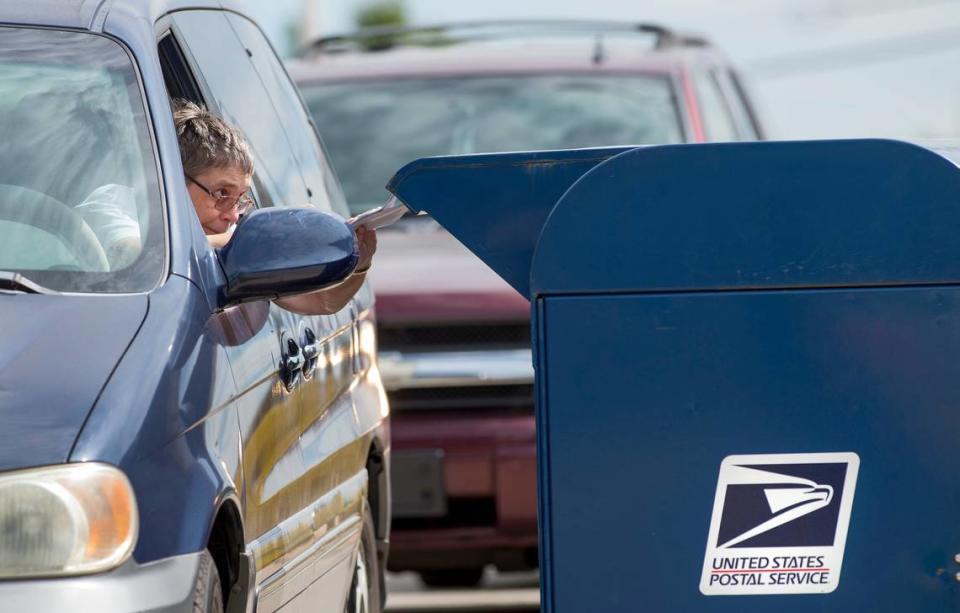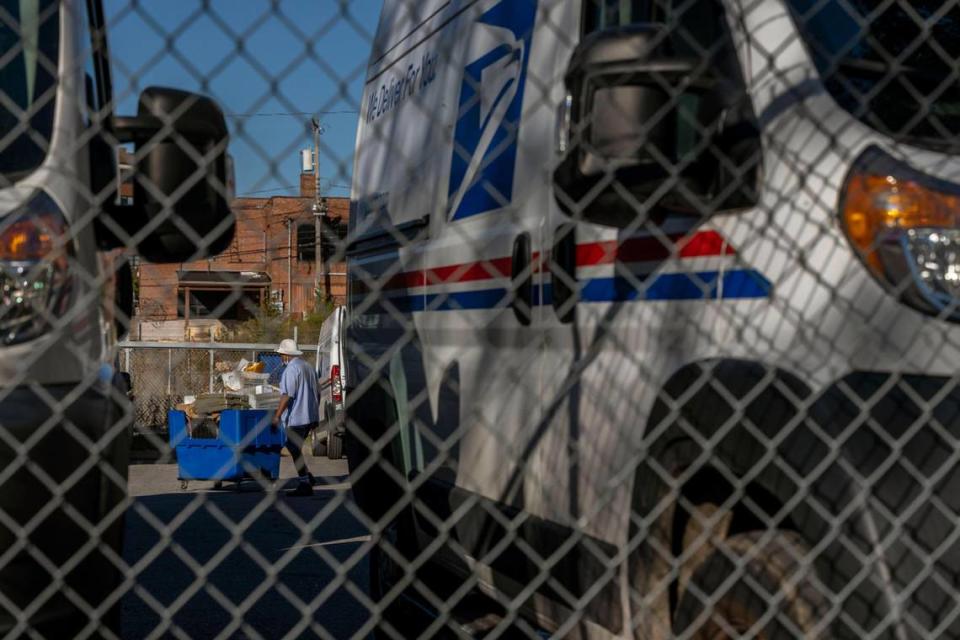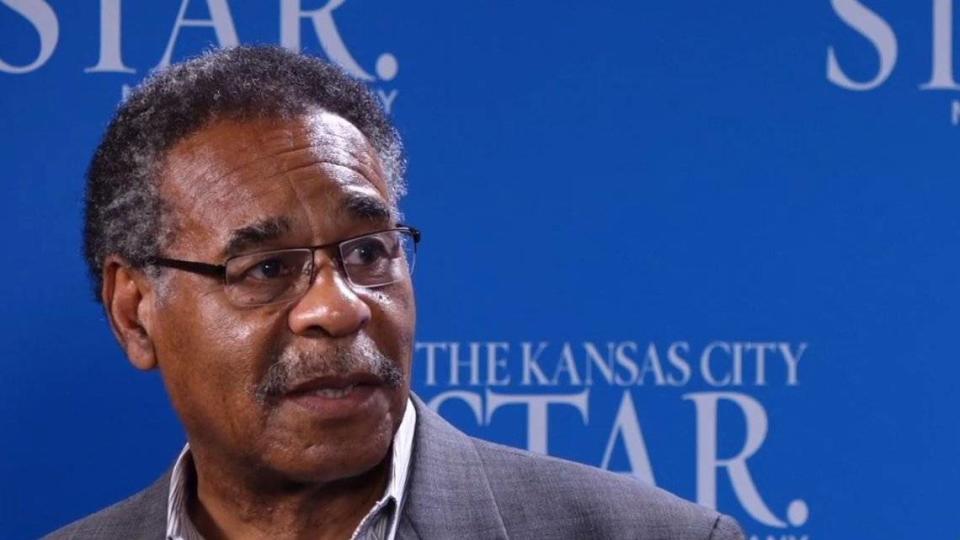‘It’s a hit and miss.’ Slow, erratic mail delivery across Kansas City angers residents
- Oops!Something went wrong.Please try again later.
- Oops!Something went wrong.Please try again later.
Nothing gets by Diana Manzella from her home office perch overlooking the south Kansas City cul-de-sac where she lives. So when her mail carrier started missing delivery days a few months ago, she noticed.
Manzella, 66, a self-described details-oriented person, was signed up for Informed Delivery, a United States Postal Service program that sends a heads-up about mail on its way. But early this year, the lag between notification and delivery began growing longer; sometimes the mail never came at all.
“It’s very sad, because what are we supposed to do? We’re supposed to rely on them. They’re supposed to follow the law and deliver our mail and yet we can’t get anybody to come on a regular basis. It’s a hit and miss,” Manzella said.
Across the Kansas City metro, complaints about the mail have been mounting for months. In conversations among neighbors and on social media sites like NextDoor, reports of late, missing and erratic mail delivery have piled up.
For Manzella, it was important tax documents that never came. One day, she finally got a post office manager on the phone.
“I was on hold for about 10 minutes. She came back, she goes ‘I’ve got quite a bit of mail here,’” Manzella said. “I said, ‘you get it to me today.’”
Some residents know exactly when the problems began – pinpointing the start of their issues to the departure of a longtime carrier or the new year. Manzella said her neighborhood never had any problems until her long-time mail carrier retired last year.
Others just have the clear sense that what was once a consistent and reliable service is now something less.
Prairie Village resident Mary Bertoldie said delivery times have grown later in the day and often occur after dark. She described not receiving any mail for a couple days recently only to finally get a thick stack of it.
“I thought, OK, they’re just not delivering it every day,” said Bertoldie, who is retired and in her early 70s.
Thursday marks the one-year anniversary of President Joe Biden signing the Postal Service Reform Act, which changed how the Postal Service pays retiree benefits, providing it with a one-time financial boost of $57 billion. The law also guaranteed six days of Postal Service delivery each week, restricting its ability to reduce service in the future.
Members of Congress from Kansas and Missouri – and across the country – have been demanding for months that USPS meet its legal obligation to provide six-day service and hammering the agency for shortfalls. The widespread frustrations have led lawmakers to send numerous letters recounting constituent complaints.
In Kansas City, Democratic Rep. Emanuel Cleaver and Republican Rep. Sam Graves have jointly pushed USPS to address delivery problems. Republican Sen. Josh Hawley has also highlighted continued delays. Cleaver and Graves announced last week the USPS Office of Inspector General has agreed to investigate.
“Whatever is happening or not happening is causing mass disruption,” Cleaver said in an interview.
In response to questions from The Star, a USPS spokesperson directed reporters to a Dec. 1 letter the Postal Service sent to Cleaver and Graves.
“We have worked continually to improve and stabilize service performance,” USPS government relations representative James D. Reedy wrote to the congressmen.
Reedy added that “temporary personnel shortages may occasionally affect delivery and hamper our ability to provide 6-day delivery in some areas of the country” without saying directly whether the Kansas City region had fallen short.
Postal service has long-term financial problems
The USPS has long been under financial strain. In the last fiscal year, the Postal Service had an adjusted loss of $473 million, a number that excludes the one-time financial benefit of the Postal Service Reform Act. In May 2022, the Postal Regulatory Commission noted that USPS hasn’t had a profitable year in the past decade but that the new law would have “significant effects” on its financial position.
Under Postmaster General Louis DeJoy, a former logistics company CEO and major GOP donor, the USPS has embarked on a 10-year transformation called Delivering for America. At the center of the plan is a push to remake the Postal Service into a financially self-sustaining operation.
DeJoy was appointed postmaster general in May 2020 by the USPS Board of Governors, which at the time was controlled by Trump appointees. President Joe Biden has now appointed a majority of the board. Postmasters general don’t serve fixed terms, but are hired and fired by the board. The White House has been critical of DeJoy, and it’s not entirely clear why the Biden-majority board hasn’t moved to replace him.
DeJoy triggered a national outcry in 2020 when he rolled out a host of changes ahead of the 2020 election that included removing collection boxes, cutting retail hours and consolidating processing facilities. DeJoy was a major ally of President Donald Trump, who had attacked mail voting. The USPS, under immense pressure, shelved the changes weeks before the election and agreed to prioritize the delivery of election mail.
But in the two and a half years since, USPS has continued its overhaul. And amid a tight labor market, which the Postal Service says has contributed to staffing shortages, and high inflation that has sent costs rising, delivery problems have emerged.
In Kansas and Missouri, 90.1% of first-class mail with a two-day delivery standard arrived on-time, according to an online performance dashboard maintained by the USPS Office of Inspector General. That’s above the national average of 89.7% but below the target of 93%.
Performance in the two states drops significantly for mail with a three-to-five day delivery standard. Only 77.8% of mail arrived on time, compared to a 90.28% target rate. Kansas is among the 10 worst-performing regions for this delivery standard, along with Iowa-Nebraska-South Dakota, Colorado-Wyoming and Tennessee.
“The service has gotten terrible,” Paul Rockwell, a Shawnee retiree, said bluntly.
At least twice, mail related to his mortgage has disappeared, Rockwell said, prompting him to stop paper billings. His cell phone bill has also arrived late, in some cases leaving him with just two or three days sometimes to make payment.
“In recent months, I’ve heard from far too many Kansans who rely on the Postal Service for their medications, bills, and business operations that their mail is being delayed or not delivered at all,” Rep. Sharice Davids, a Democrat who represents much of the Kansas side of the Kansas City metro, said in a statement.
Davids, whose mother is a retired postal worker, promised to “keep pushing” to ensure Kansans feel the benefits of the postal reform law.

USPS, unions blame staffing
For Fairway Optical Products in Kansas City, delivery delays can quickly lead to financial consequences.
President Steve DesBien said that while mail is often placed into the business’ P.O. box on time, its physical location on The Paseo may not get mail for days at a time. DesBien said he’s working on online payments, but more than half of the revenue still arrives through the mail in the form of checks.
“If I don’t get my cash, I can’t pay my employees and I can’t pay my vendors,” DesBien said.
Postal workers and USPS both blame staffing problems for service disruptions. But while the Postal Service’s leadership emphasizes the difficulty attracting applicants amid low unemployment, workers fault on-the-job conditions and a lack of support from management.
Mark Dimondstein, president of the American Postal Workers Union, said service problems are widespread, affecting all corners of the country. More than a decade ago, the USPS began using more “non-career” positions, which aren’t as attractive initially and have fewer incentives to foster a long-running career – leading to more turnover, he said.
“Add to that ingredient the way people are treated once they get there. And we’ve just had too much abuse, too much of a toxic work environment,” Dimondstein said in an interview. “It’s not new in the post office, but it’s getting worse.”
Toni Robinson, president of APWU Local 67, which represents postal workers in the greater Kansas City area, said a lack of training has contributed to a churn of employees and efficient operations. A USPS Office of Inspector General report released in early 2020 before the pandemic found that the turnover rate of non-career positions across the entire Postal Service was nearly 39%.
Robinson’s local union represents about 1,250 employees, including area clerks, maintenance staff and tractor-trailer drivers. Mail carriers are represented by a separate union, the National Association of Letter Carriers, which declined to comment.
“The biggest issue is training, getting even the management staff to understand the United States Postal Service because a lot of them do not, they haven’t been here long enough to know how to run” the Postal Service, said Robinson, who has worked for the Postal Service since 1985.
The Star asked USPS spokesperson Mark Inglett to identify the severity of staffing shortages in the Kansas City area and the primary drivers of shortages. The spokesperson referred to the Dec. 1 letter to Cleaver and Graves.
“Unfortunately, the Kansas City region, like many other areas of the country, has had trouble hiring the appropriate number of personnel. In Missouri, the unemployment rate is 2.4 percent, and 2.6 percent in the Kansas City region, where employee availability issues have led to inconsistent service,” Reedy wrote in the letter.
Reedy wrote that USPS was “working aggressively” to hire an additional 80 career carriers and 43 substitute carriers. Employee availability “has been the main factor affecting delivery in the Kansas City region and other parts of the country,” Reedy wrote.

Should Congress do more?
Paul Steidler, a senior fellow at the Lexington Institute, a Virginia-based center-right think tank, said the Postal Service is constrained in the rates of pay it can offer, making it more difficult to recruit workers in metro areas. Still, Steidler, who has studied the USPS and supply chains, said the Postal Service could transfer workers on a temporary basis to address severe problems.
The Postal Service had more employees last year – 516,760 – than any year since 2012. At the same time, first-class mail volumes continue to decline and are at their lowest point since the early 1970s.
“It’s not a particularly busy time of year. It’s not the Christmas season, it’s not the election season,” Steidler said. “It really should be fixed and should have been fixed a long time ago.”
Cleaver floated in an interview the idea of reviving a U.S. House committee tasked with overseeing the Postal Service. The House Post Office and Civil Service Committee, begun in 1946, was discontinued in 1995 after Republicans retook control of the chamber the year before.
The issues with the Postal Service have risen to the point where it is time to re-establish the committee, Cleaver said. He added that challenges within the Postal Service require near-daily attention.
“It is a massive, massive problem and we’ve got to deal with it,” Cleaver said. “I know that most people thought that day was over when we needed to have a committee and now I think we need it more than ever.”

Sen. Jerry Moran, a Kansas Republican, said he’s been thinking about whether mail processing centers need to be reopened in Kansas. Numerous Kansas centers have been shuttered over the years.
Moran said every week his staff provides him with a list of issues constituents have raised with his office and every week, mail problems make the list. He said he understands the challenges posed by short staffing, but indicated USPS can’t cite that forever.
“That’s a problem that lots of businesses face, but it’s a problem that every business needs to solve. So it can’t be an excuse very long,” Moran said.
In the meantime, the complaints continue to roll in.
Sharon Lockhart, an 80-year-old Leawood resident, said she receives a lot of mail because she has durable power of attorney for a cousin. She also gets mail, often junk, meant for deceased family members.
In recent months, days sometimes go by without Lockhart receiving any mail. She suspects it’s because it hasn’t been delivered.
Her mail has been erratic enough recently that when spoke with The Star on Tuesday, she expressed surprise that she had actually gotten regular delivery over the past week.
“I had mail on Saturday, Monday and Tuesday. Now that’s unusual,” Lockhart said.
Manzella, the south Kansas City resident, said she has done everything she can to try to improve delivery for her and her neighbors, including reaching out to Cleaver. She expressed gratitude that lawmakers are “fighting our battle for us.”
But her days of turning to the Postal Service may be over.
“I barely keep stamps around here. I’m not going to use the post office. If I can send it some other way, I will,” Manzella said. “I don’t trust them. There’s no trust in the post office today.”

